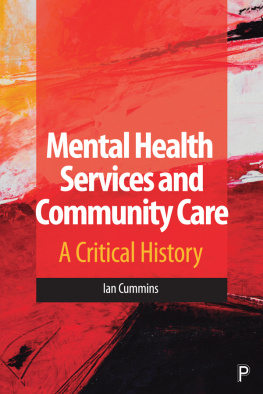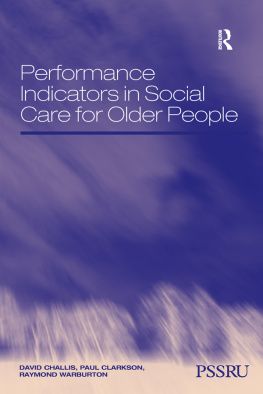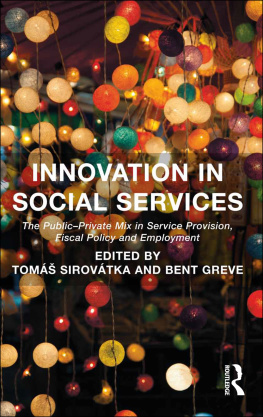NATIONAL INSTITUTE SOCIAL SERVICES LIBRARY
Volume 23
CHARGING FOR SOCIAL CARE
First published in 1980 by George Allen & Unwin Ltd
This edition first published in 2022
by Routledge
2 Park Square, Milton Park, Abingdon, Oxon OX14 4RN
and by Routledge
605 Third Avenue, New York, NY 10158
Routledge is an imprint of the Taylor & Francis Group, an informa business
1980 Ken Judge and James Matthews
All rights reserved. No part of this book may be reprinted or reproduced or utilised in any form or by any electronic, mechanical, or other means, now known or hereafter invented, including photocopying and recording, or in any information storage or retrieval system, without permission in writing from the publishers.
Trademark notice: Product or corporate names may be trademarks or registered trademarks, and are used only for identification and explanation without intent to infringe.
British Library Cataloguing in Publication Data
A catalogue record for this book is available from the British Library
ISBN: 978-1-03-203381-5 (Set)
ISBN: 978-1-00-321681-0 (Set) (ebk)
ISBN: 978-1-03-205534-3 (Volume 23) (hbk)
ISBN: 978-1-03-205549-7 (Volume 23) (pbk)
ISBN: 978-1-00-319803-1 (Volume 23) (ebk)
DOI: 10.4324/9781003198031
Publishers Note
The publisher has gone to great lengths to ensure the quality of this reprint but points out that some imperfections in the original copies may be apparent.
Disclaimer
The publisher has made every effort to trace copyright holders and would welcome correspondence from those they have been unable to trace.
First published in 1980
This book is copyright under the Berne Convention. All rights are reserved. Apart from any fair dealing for the purpose of private study, research, criticism or review, as permitted under the Copyright Act, 1956, no part of this publication may be reproduced, stored in a retrieval system, or transmitted, in any form or by any means, electronic, electrical, chemical, mechanical, optical, photocopying, recording or otherwise, without the prior permission of the copyright owner. Enquiries should be sent to the publishers at the undermentioned address:
GEORGE ALLEN & UNWIN LTD
40 Museum Street, London WC1A 1LU
Ken Judge and James Matthews, 1980
Crown Copyright Reserved.
British Library Cataloguing in Publication Data
Judge, Ken
Charging for social care. (National Institute
for Social Work. Social services library;
No. 38).
1. Public welfare Great Britain Finance
I. Matthews, James
338.43361941 HV248 80-40569
ISBN 0-04-361040-4
ISBN 0-04-361041-2 Pbk
Set in 10 on 11 point Prees Roman by Alden Press Ltd, Oxford, London and Northampton and printed in Great Britain by Billing and Sons Ltd., Guildford, London and Worcester
ACKNOWLEDGMENTS
This book is based upon a report delivered to the Department of Health and Social Security (DHSS) in 1978, entitled Pricing Policy and the Local Authority Social Services, which was financed by the Small Grants Committee of the DHSS. We are grateful to the department not only for its financial support but also for making available unpublished data in machine-readable form and for the advice and encouragement of individual members of the DHSS. However, the recommendations and views expressed are not necessarily those of the department. We would also like to express our gratitude to the large number of local authorities and other organisations that provided us with much helpful information. In particular, we would like to thank the following individuals for their assistance: Stuart Barraclough, David Collard, David Donnison, John Doyle, Maurice Hawker, Hilary Lance, Don Latham, Mike Lowcock, Bronwen Matthews, Alan Maynard, Graham Room and Peter Watson. Our former colleagues in the Department of Social Administration at the University of Bristol and the School of Humanities and Social Sciences at the University of Bath also assisted us by providing a stimulating environment within which we were able to work, and we are especially grateful to all of them. Finally, our greatest debt, for much forbearance as well as practical assistance, is to our respective wives, and this is partly acknowledged in the dedication.
NOTE ON ABBREVIATIONS
The following abbreviations are used in references throughout the book:
CIPFAChartered Institute of Public Finance and AccountancyCmdCommand PaperCmndCommand PaperDHSSDepartment of Health and Social SecurityDOEDepartment of the EnvironmentGHSGeneral Household SurveyHCHouse of CommonsIEAInstitute of Economic AffairsLBALondon Boroughs AssociationMOHMinistry of HealthNCCNational Consumer CouncilNCHHSNational Council of Home Help ServicesNHSNational Health ServicePPParliamentary PapersSBSupplementary BenefitsSBCSupplementary Benefits CommissionSCPSSociety of Civil and Public ServantsSSCSocial Services CommitteeSSDSocial Services Department
To Chris and Ros
Chapter 1 INTRODUCTION AND SUMMARY
One of the characteristic features of the British system of social welfare, in theory, is that available resources are rationed according to somewhat elusive concepts of need rather than by recourse to the price mechanism. The reality, however, is that this principle has never been fully established in practice, and consumer charges for different social services have been an integral part of the historical development of the welfare state. For example, at the beginning of the twentieth century the Minority Report of the Royal Commission on the Poor Laws painted a graphic picture of the varied development of, and inconsistencies in, charging policies:
Practically all the Local Authorities affording Public Assistance in any form Poor Law, Public Health, Education or Police Authorities have the power, in respect of some of their services, to charge the whole or part of the cost upon the individual benefited or the persons legally liable to pay in respect of him. These powers differ from service to service and from Authority to Authority, alike in the amount or proportion of the expense that is chargeable; in the discretion allowed to the Authority to charge or not to charge as it sees fit; in the conditions attached to the charge or exemption from payment; in the degree of poverty entitling to exemption; in the degree of relationship entailing payment for dependents, and in the process of recovery and its effectiveness. This chaotic agglomeration of legal powers, conferred on different Authorities at different dates, for different purposes, but all alike entailing on the individual citizen definite financial responsibilities, proceed upon no common principle. Moreover, the practice... is even more wanting in principle than the law; varying, indeed, from systematic omission to charge or recover anything, up to attempts to exact an entirely prohibitive payment for the service performed. (Poor Law, 1909, p. 286)
Since this was written, all the social services have undergone substantial modification and rationalisation, but many of the new statutes have retained clauses enabling public agencies to charge consumers. Moreover, as many of the agencies are local authorities, which jealously guard their autonomy, the chaotic agglomeration of charging policies has persisted to the present day. In fact, since the onset of prolonged economic depression and with the persistence of financial constraints on public authorities, there have been repeated calls from the government (DOE, 1975, para. 21), from local authority leaders (






